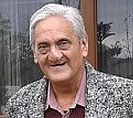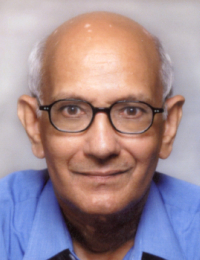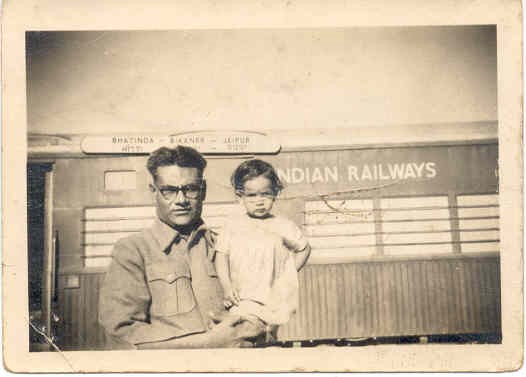Jhalawar 1952-54
Category:
Tags:

Prakash Mathur, nicknamed ‘Titi’ by his dadi and called ‘P C’ by his friends was born in Alwar, a constituent Princely State of the Rajputana Agency since 1832, on June 1, 1940 in a diasporic family of civil service Kayasthas drenched in the Mughal-Muslim culture of Old Delhi. He passed away in 2015. He was a University of Rajasthan faculty pensioner with a continuing passion for academic activity ‘To see Rajasthan better, To make Rajasthan better.’ His wife Shashi and his daughter Sfoorti live in Jaipur.

Kailash Mathur, called Chanda by his parents, is an electrical engineer, who was born in Tijara, which is even now a very small city in Rajasthan. He lived in East Germany from 1965 to 1971, where he married Annemarie, a German, in 1969. Since 1971, he has lived in Vienna, Austria. He became a widower when Annemarie died of cancer in 2004.
Editor's note: Kailash wrote his account first, on which P C added some more memories. The authors are my older brothers. These accounts were written in 2004, after our father passed away.
Kailash Mathur
My father, Shri Khem Chand, was the Collector and District Magistrate of Jhalawar district from April 1952 to January 1954. We lived in the district's capital, also named Jhalawar, which is still a small city.
The collector's residence was a very big house with a huge garden that contained even a lemon orchard. The entrance drive was long and we could see from the first floor balcony that some visitor was coming and as the visitor still struggled to get the gate opened by the gate guard.
The guard, a policeman, stood in the front of the gate with the rifle held in his front. Specially the bayonet attached to the rifle used to frighten us children, the eldest being 13 years old. The guards tried to be friendly with us and smiled at us.
The whole family stayed on the first floor\; the ground floor was only used for receiving the guests and by us, children, as playing arena.
Jhalawar is a small town with no attractions and also our school was a simple one with no pretensions. We (Titi and myself) went to the school in Daddy's office jeep, but the school was not very far and sometimes, when the jeep did not come at the proper time, we simply walked home.
What I remember most about the school are the punishment methods used in those days. I was a rather good student in the 5th and 6th class, standing mostly 1st or 2nd, so I do not remember being actually punished. But watching others getting punished was also painful and unforgettable. The usual method of punishment was to place a pencil between the fingers and then press the fingers, to twist the ear, to hit the palms with a stick, to make the pupil stand in a corner, etc. Sometimes even the student had to stand outside the class, which was not good for the pupil, as it was the talk of the day in the school.
The school was in the middle of the city. Two of our school mates lived just opposite the school. Their parents were producers of lemon drops. Sometimes we used to go to their house to eat lemon drops. They had a kitchen in which dissolved sugar was thickened to a syrup by heating it in very big open vessels and then cooled and cast in to a mould.
There must have been no girl's school in the city as for teaching Dolly (younger sister, formal name Manmohini) a teacher (pandit ji) used to come our house.
We were then already a big family of 11 persons. There were Daddy and Mummy, 7 children (the eighth child, Satish, was born later), Chachaji (my father's brother), and Dadi, my grandmother.

Chachaji with Meenu, my youngest sibling at that time. Jhalawar. C. 1952
Mummy had a lot to do in spite of the servants. The servants were always simple people from the nearby villages, with no idea about our food habits or way of life. Each new cook had to be taught, how the food was to be cooked and was eaten in our family. The villagers hardly use any spices or meat, as they cannot afford it and they have no idea about the tableware and cutlery. Daddy was always very particular about how clean the tableware and cutlery had to be, and how it had to be arranged on the table, etc.
Another big work for Mummy was to see that each and every one of us had the required clothes. Shirts, pants, knickers (shorts), and coats were made by the local tailors, who came to our house to take measurements. But knitting pullovers was Mummy's work. I remember that she always struggled but could not keep the schedule as the winter approached. She however made very good pullovers, with complicated designs from magazines. Even getting the right wool and needles was a big problem. I was always very proud of her pullovers.
As growing children, we started going to cinema and circus for the first time in our life in Jhalawar. We only had only to phone the cinema and the tickets were reserved for us. Sometimes we even did not have to pay for the tickets, as we were the District Collector's children. As far as I remember Daddy and Mummy never went to cinema or circus in their whole life. We were delighted to be able to go to cinema, and Dolly came along with us in Jhalawar. I remember laughing and enjoying the simple circus of those days so much and I still think the clowns of those days made the best jokes.
In Jhalawar, the family also started to keep cows or buffalos at home, as the milk delivered at home by the milkman was not of good quality. It was most probably diluted. We had a servant to look after the animals, but Mummy had to see that the servant did his job. Sometimes I assisted her in this work. When the cow did not deliver enough milk, which was usually the case, Mummy would go and look if the animal was sick. At times, we changed the animals.
In India of those days no soft drinks were sold. Instead, people made sharbet at their home, if they could. We, in Jhalawar, had a lot of plants in our garden, whose flowers contained significant quantity of nectar, so that sharbet could be made out of them. These flowers attracted butterflies, and I remember having seen very big butterflies (size of small bird) in Jhalawar.
We also had Jasmine trees in our Jhalawar home. Whenever I smell Jasmine anywhere, the pictures of our Jhalawar come to my mind.
We also had a regular cricket pitch in the front lawn of our house. I remember that we invited our classmates to play cricket with us there. In Jhalawar, we were completely equipped with bats, balls, wickets and bails.
P C Mathur
Jhalawar was, indeed, a very small town although it was the headquarters of a district, of which there were only 27 in Rajasthan which, even then, amongst the largest states of India. Jhalawar was the capital of a very small Princely State which the British carved out of a very much older and larger Princely State of Kota for rewarding a loyal Rajput jagirdar who supported them in re-establishing their control.
Jhalawar was thickly forested on account of high rainfall, which broke all records in the year we arrived there. In 1953, it was not on the railway map of India as it is even now (2004) without a rail-head which is nearly 18 miles away. Its population at that time must have been only 15, 000.
It was a very beautiful country-side with hills, forests and brooks all over and many small tanks and lakes and, of course, lots of wild animals for a Shikari (hunter) like Daddy.
Madho Vilas, our home at Jhalawar was, indeed, a large palatial building surrounded by a very large wild garden and a magnificent front lawn where we could play cricket. In fact, cricket was our passion in those days and we had plenty of friends with whom we could play using a tennis ball and stones as wickets. Two sons of one of daddy's subordinate, a Sub-Divisional Officer, Arun and Brijesh, played with us regularly. We were frequent visitors to their family, which contained many sisters some of whom I have met at Jaipur. I continue to bump into some of their relatives even now in Jaipur.
Another Mathur family with whom we interacted regularly belonged to Shri Jagan Prasad. He was a "Reader" attached to the Collector. As part of his duties, Shri Prasad regularly accompanied Daddy on all his tours. Daddy regularly turned his tours into hunting expeditions, making the driver of his official jeep run at break-neck speed after Deer and other wilder game. Daddy paid little attention to Jagan Prasad ji's entreaties, which bore the full sanction of our grandmother, to be more careful.
Jagan Prasad ji's sons were very friendly with us and were regular visitors to our home. They were all, especially those in our age-group, studious. Laxmi Mohan became a college teacher. Shyam Mohan joined the Indian Police Service (IPS). And Hari Mohan did so well in his studies that he simply carried on with them even though he joined the Indian Administrative Service (IAS). He is still carrying on in the same vein even after retiring as one of the senior-most civil servants in the Rajasthan cadre of the IAS. Incidentally the road on which he built his house in one of the poshest colonies in Jaipur bears his father's name.
The Malsadar Middle School which Chanda and I attended at Jhalawar was a government school located in a building which must have housed an important office. However, the building was woefully neglected with a large courtyard full of dust. Our Headmaster was a very strict disciplinarian although I also seldom faced his wrath. Ultimately, I secured a first division in the VIII class in an examination conducted by the State Board, an all-state behemoth which exists even today although the system of "Board" examinations was done away with for a long time and the Board confined itself only to Class X and, later, Class XII examinations. The "Middle" examination was a formidable phenomenon when I passed it with flying colours. The flying which I did in 1953 was not re-attained by me till 1961 after a series of mediocre performances in 1955, 1957, and 1959.
At Jhalawar, Chanda and I got into stamp collection, making pen friends and mail-ordering stamp packets from a Philately shop in Bombay. I think I still have the Stamp Album and a Philately book which we got at Jhalawar plus some stamps from those days which we stored in envelopes taken from the cellar from our Munshi Bazar (in Alwar) house which bear the Seal of the Princely State of Alwar.
One of my major pleasures at Jhalawar, apart from exploring the countryside, was reading books at the College library where I joined the Class IX. I used to discuss academic matters with Hari Mohan ji, even though he was my senior by 3 to 4 years. Hari Mohan ji soon left Jhalawar to do his B.A. from Udaipur and M.A. from Allahabad University. Even though my literary sensibilities leave much to be desired even now, I did read many famous English novels at Jhalawar including David Copperfield. (Later, at Bikaner, I read a lot of detective novels, Tarzan tales and, of course, Comics plus Dennis Wheatley novels which opened an "Occult" window in the occidental vein.)
Another Mathur family we met at Jhalawar and whose members I continue to meet was headed by Shri Anand Mohan Lal who was, at one time, a Deputy Registrar at my University (Rajasthan University). We cross his house (B-77, Rajendra Marg, Bapunagar) we cross as we go to our local market. The family connections are still very strong with his widow and younger brothers many of whom are known to our family including Viren (husband of Dolly, younger sister) who is related to this Jhalawar family.
One of the most memorable memories of Jhalawar relates to Subodh who had a golden coloured coat of which he was very fond. He would ask our servant, Mumtaz, "Mumtaz ji main to wahi coat pahnuga (Mumtaz saheb I will wear only that coat).
Daddy also used to relate a story about Ashok and Subodh who decided to take revenge upon a dental practitioner, Dr Bhatia, who had caused some pain to Mummy, while removing one of her teeth.
© Kailash Mathur 2016
Comments
Very interesting, new
Add new comment